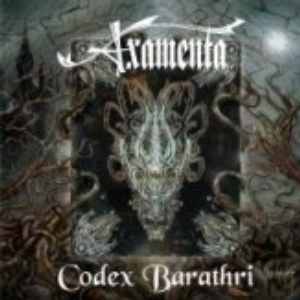
2003-01-13
The latest album by Axamenta evokes the interesting debate regarding the status of music, being either a significant, meaningful ideology-bearing form of deliverant art, or a mere, lower form of impulsive entertainment. By issuing an output often enjoyable, at times thrilling, the Belgian group of Epic Extreme Metalists initially drives the listener to feel great sympathy and affection towards their music. However, as one attempts to delve further and reaches no intrinsic findings of essence, the admiration for the band lose a bit of its solidity.
Axamentia play what some like to call “Fantasy Metal”. They feature a sonical output of mid-to-high-tempo rhythm section, spurring a vivid riffing guitar to play crunchy, melodic riffs, alternately harmonized or melodically contrasted by grandiose, symphonic orchestral keyboard movements. The lyrics are being manifested by a variety of vocal entities, including mostly extreme growls and shrieks, seldom replaced by clean male singing.
The aesthetical consequence of the described traits, associated by great production work, is exceedingly palatable. The guitar movements and compositions are dynamic and varied, the vocals are well imbeded within the context, and, most of all, the keyboard work is magnificent - inpired, fastidiously composed layers of symphonic splendor, occasionally evolving to brilliant, melodic lines of befiting sinistrality, giving an additional, surprising and overwhelming flavor to the preceding bulk of standardized Metal. A sole exception is the lead guitar performance, which is weak, creatively and tecnichaly.
However, to the abosrbant, demanding listener, the aforementioned seemingly-pleasing totality lacks certain crucial aspects, rendering it, in my opinion, insuffiecient. The main problem of Anaxetia’s creation stems from its innermost, interior thematic core, or shall I say: the absence of it.
No ideology or views are reflected on the work of Anaxetia. Their compositions indeed sound “Epic”, but this attribute is not generated buy any substantial principle, thus consists of nothing but exterior traits. This notion is well aparent in the musical output: although defining themselves as an Extreme Metal band, by adopting the genre’s attributal descriptive code, this is a merely outwards statement. In fact, most of the guitar parts have the dynamics of the shallow, commercial and clichי-infused Power Metal. The lyrics are literary dull, conveying rather unripe and trite scenes, a symptom which unavoidably permeats into the field of compositions, in which any necessary, binding construction of recuring motives is critically absent. By having no stable, stout tenet to be propped upon, The band’s aesthetic true excellence is founded on nothing more than a mire of commercial aspirations. Indeed, the few genuine Extreme Metal segments, thoroughly influenced by Black and Death Metal, are undoubtly the most convincing parts of the album. Nevertheless, being sporadic and coincidental, these are very few.
Thus, in a way awfully similar to the Guthenburg Death Metal scene, the Extreme Metal features, which were originally molded for the deliverance of certain intelectual ideal thinking and state of mind, thus proudly acheiving the recognition of a stated ideological and coonceptual art, were disconnected from its primal fountain, cynically applied as an mass-appealing attraction. This, Axamenta do very well (I am forced to admit I actually enjoyed listening to most of the album). Is it proper and acceptable to legitimize such entertainment-oriented release buy purchasing it and supporting the band? This subjective decision is the private burden each of us carries.
Tom Orgad
